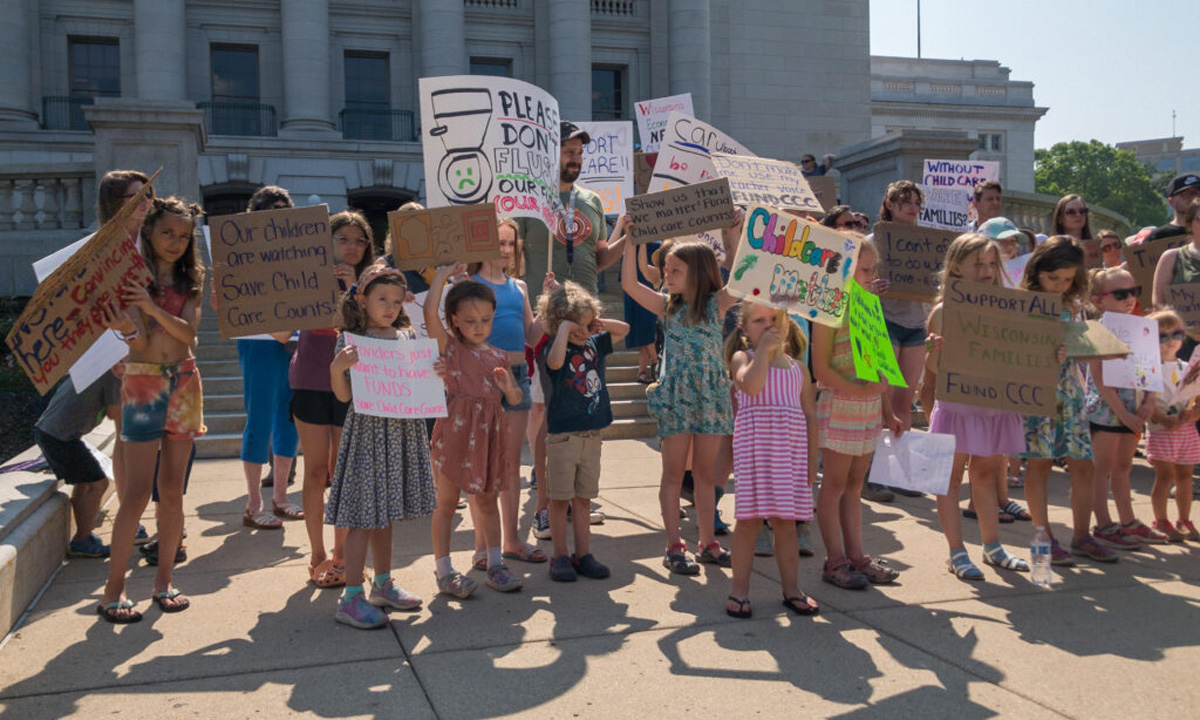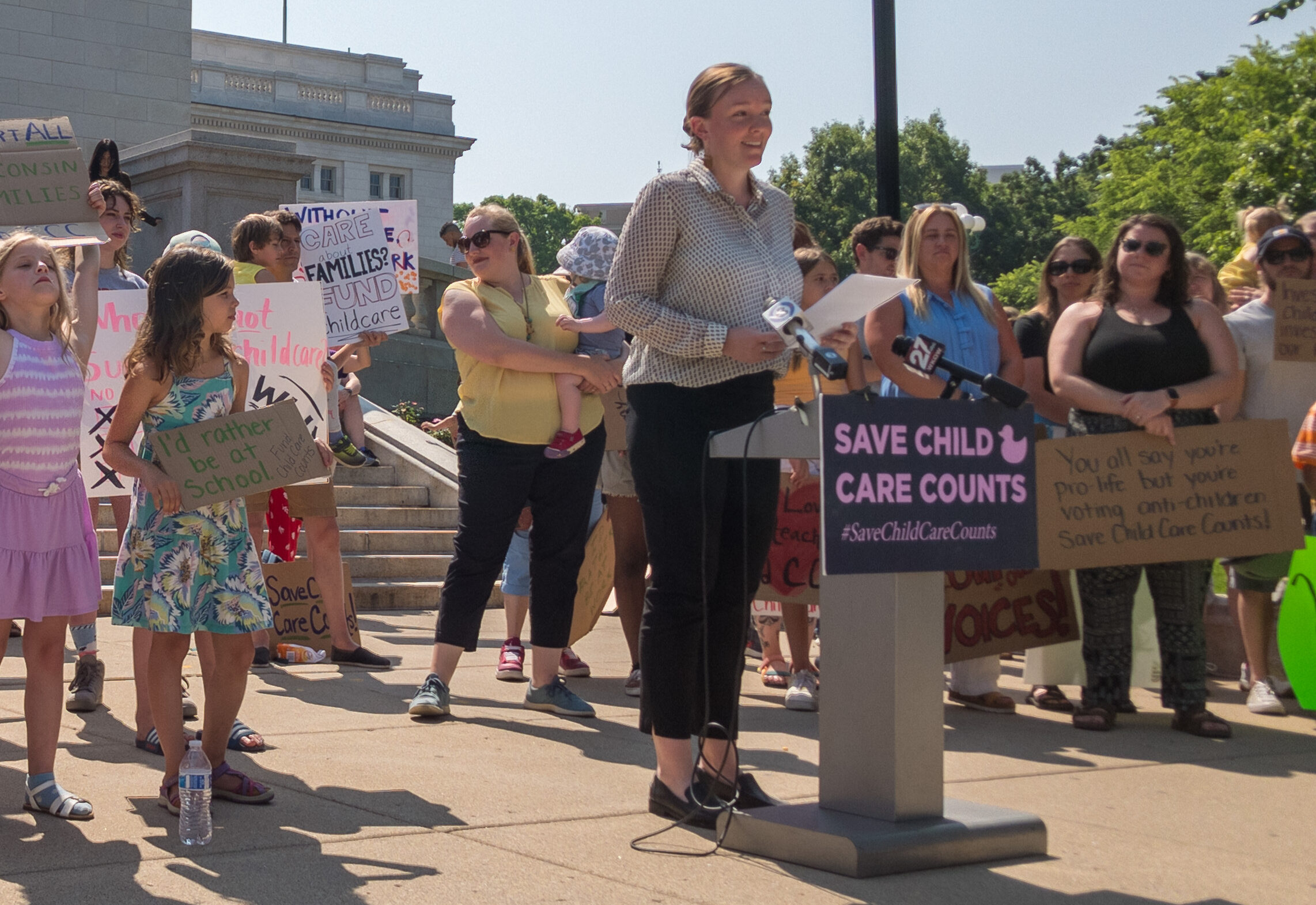Wisconsin Child Care Providers Warn Loss of Funding Could Force Centers to Close
Republicans on the Joint Finance Committee eliminated funding Child Care Counts last month without explanation.

Get stories like this delivered straight to your inbox. Sign up for The 74 Newsletter
Mykenzie Ritschard of New Glarus had not signed up to speak at Tuesday’s rally in support of funding Child Care Counts, funding that Republicans on the Joint Finance Committee eliminated last week without explanation. But when organizer and child care provider Corrine Hendrickson opened up the podium to whoever wanted to speak, Ritschard fought through tears and sobs to tell her story.
Ritschard’s son, the oldest of two children, has autism. She struggled to find child care until she offered to quit her “dream job” in a dentist’s office to work at The Growing Tree, a New Glarus child care center owned and operated by child care advocate Brooke Skidmore.
Skidmore “jumped at the offer mostly because she’s so short staffed,” Ritschard said.
Additionally, when Ritschard’s son was diagnosed with autism, Skidmore allowed his therapists to come into the center to work with him, something not many child care centers permit.
“We’ve seen so much progress,” Ritschard said. “I really don’t know where we would be without the opportunity that we were given.”
Ritschard, Hendrickson, Skidmore, and several other child care providers spoke on Tuesday about the potentially devastating consequences of cutting Child Care Counts funding from the budget, for them, their students, and the economy as a whole as families have to make hard decisions in the face of a shortage of openings and rising costs.

“We are here because we are trying to make clear just how misguided this decision is,” said Assembly Minority Leader Greta Neubauer (D-Racine). “It is our job to design and implement programs that help fill the gaps in essential services in the state of Wisconsin. This decision by the GOP to gut the program will do the exact opposite. It is cynical, it is shortsighted, and it is wrong for the state of Wisconsin.”
The $340 million Gov. Tony Evers had in the budget for Child Care Counts was to maintain the program, which many providers stated was not enough. From Jan. 1 until Tuesday’s rally, the Wisconsin Department of Children and Families recorded 166 child care centers had closed. Many said that without that financial support, they may have to raise their rates up to $50 per week per child, putting families in a bind. A May 2023 report from the Wisconsin Policy Forum (WPF) found that year-round child care is more expensive than in-state tuition at any University of Wisconsin school.
Vince Williams, policy advisor for State Sen. Howard Marklein (R-Spring Green) who co-chairs the Joint Finance Committee (JFC), told Hendrickson in an email that Child Care Count “meant to provide short-term relief.”
“It is important to recognize that the Child Care Counts program was started with one-time, federal COVID relief money” Williams wrote. “This funding is not ongoing and ends this year…Child Care Counts was an important program to help child care centers, employees and families weather the pandemic. But, again, it was funded with one-time, federal relief funds and was not meant to continue.”
Williams also pointed to the $95 million JFC allocated for other child care programs:
$45 million for the Wisconsin Shares program, which provides subsidies for low-income families to pay for child care.
$30 million for Quality Care for Quality Kids which will fund the resumption of YoungStar bonuses paid directly to child care centers.
$5 million for REWARD stipends that are paid directly to child care workers.
$15 million for a new revolving loan fund for start-up child care centers.
Last week JFC approved raising the household income ceiling for accessing the Wisconsin Shares program from 185% of the federal poverty level to 200%, making it more accessible to low-income Wisconsinites. The budget motion also eases the reduction of benefits when a household’s income increases above the ceiling, reducing the “benefits cliff.”
The WPF’s report found that cutting Child Care Counts without implementing new funding streams could “re-creat[e] the same or even greater challenges for the industry, families and the economy at large,” however.
Advocates say one obstacle is a profound misunderstanding of early childhood education and the child care industry. Phillip Scott, co-owner of Crone Apothecary, struggled as a single father to find child care for his son. Scott and several other small business owners went to Washington D.C. with Main Street Alliance in May to advocate for federal child care funding. According to Scott, when they met with Wisconsin Sen. Ron Johnson, Johnson said something about “single women need to stop having babies out of wedlock” and could “easily find a rotation with other moms and take turns.”
“We went quiet… [T]he ladies in the room that were child care workers got very, very upset,” Scott told the Examiner. “When this is what is being talked about at the federal level, I can only imagine what the Republican Party is discussing here at our Capitol.”
Based on his own experience, Scott said this could have a major impact on the current labor shortage and entrepreneurship.
“Right now, we’re struggling with people having to decide, do I wanna work and pay 40 to 60% of my income to be able to send my kid to child care so I can actually have a job? Or do I just stay home and figure that out. And typically, if it’s not a two-income household, that’s not even an option,” Scott said. “I do have a lot of friends that are entrepreneurs that unfortunately the mom or the dad have chosen to stay home. And being [a single-income household] has made it hard.”
“If we don’t fix this problem and extend this money to be able to move this forward for children in our state, we’re gonna fall behind economically,” Scott said.
Beyond the impact of cutting funding for Child Care Counts, Nicky Krause of New Glarus took to the podium to voice her concerns about what the decision said about democracy in Wisconsin. She recounted how, despite probing from state Sen. Kelda Roys (D-Madison) for an explanation, none of the Republicans who voted to remove the funding gave an explanation why.
“We have an issue where there’s 80% popular support. That to me suggests that this is not a partisan thing and yet the lawmakers did not feel the need to explain what their reasons are,” Krause said. “And if they give no reasons, then we can’t exactly find a pathway to compromise and reconciliation. So it’s disturbing. The democracy cannot function if there isn’t this basic reciprocity, and I don’t see that.”
The response from Marklein’s office was sent to Hendrickson almost immediately after the rally. The only explanation given was that the funding initially came from the federal government. In a state with a $7 billion budget surplus, advocates say that explanation seems incomplete.
None of the state’s big business lobbies or right-wing think tanks have explicitly come out in support of the decision. However, Rachel Ver Velde, senior director of Workforce, Education and Employment Policy at Wisconsin Manufacturers & Commerce, told a state Senate committee on Monday that WMC favors “tax credits for employers to set up employer based child care options to or to buy slots for their employees.”
“We think that a lot of employers view this as something that is important, and they want to help provide those resources to their employees,” Ver Velde said. “I think they would have a higher incentive to do so if there was tax credits tied to that as well.”
Hendrickson, responding to Ver Velde’s comment over email, wondered why other businesses should get tax credits instead of the state directly funding child care providers. Tying child care to an employer limits access, she added.
“What happens when that business closes or lays people off, etc and then that child no longer has care and the parent can’t access it to find a job?” Hendrickson asked. “How does a small business with a lot of employees — retail, bars, restaurants — compete with big businesses? This is one more way that large businesses can continue to monopolize industries.”
Hendrickson also said tax credits wouldn’t necessarily translate to higher wages for child care workers, which is needed to keep centers staffed. WPF’s report found that lead early childhood educators earn on average $24,981, or $12 an hour assuming a 40-hour workweek.
Lani Harrison, who used to work at The Growing Tree in New Glarus, also took to the podium on Tuesday to explain why those wages were not sustainable.
“I loved my job,” Harrison said. “I enjoyed the challenges. Every day was a new adventure with the amazing and inquisitive minds of a child.”
But even with a Bachelor’s degree, her family was living paycheck-to-paycheck, with no health insurance, dental insurance, vision care, retirement, or student loan forgiveness. She saw more than 35 of her coworkers leave child care. Eventually Harrison, too, left the profession to become a special education teacher at a public school.
“[Child care] teachers will continue to leave the field for higher paying jobs that are less stressful and have benefits,” Harrison said. “How can child care providers stay open without the crucial resource for teachers? How can the rest of the society work without child care?”
Wisconsin Examiner is part of States Newsroom, a network of news bureaus supported by grants and a coalition of donors as a 501c(3) public charity. Wisconsin Examiner maintains editorial independence. Contact Editor Ruth Conniff for questions: [email protected]. Follow Wisconsin Examiner on Facebook and Twitter.
Get stories like these delivered straight to your inbox. Sign up for The 74 Newsletter

;)